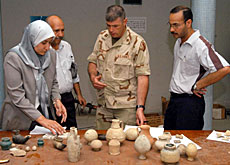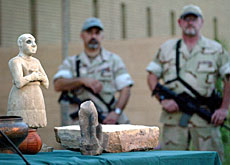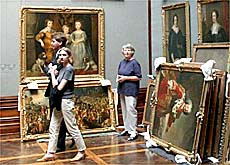Ancient artefacts “not for sale” in Switzerland

Swiss, British and Iraqi officials have gathered in Geneva to discuss how to prevent the plundering and trafficking of ancient artefacts.
The two-day “Not for Sale” forum is also examining new British and Swiss legislation, which aims to crack down on the illegal trade in stolen cultural goods.
Internationally, stolen art is the third largest illegal market behind drugs and the arms trade, according to Interpol and Unesco.
“It’s quite important that both countries have agreed to ratify existing international conventions and to publicly show their determination to fight the looting of cultural treasures,” the co-president of the conference, Pierre Lalive, told swissinfo.
“The illicit antiquities trade is a lot like drug trafficking,” Lalive added. “If there were no consumers, there would be no suppliers… so the most effective way to combat this trade is to make purchasing more difficult through tighter legislation.”
Joint effort
Around 150 people, including customs officials and Interpol officers, were due to take part in the event, which was jointly organised by Geneva’s Art-Law Centre, the British Embassy in Bern and the British Council in Switzerland.
Representatives of the Swiss commission to the United Nations Educational, Scientific and Cultural Organisation (Unesco) – along with legal experts and museum curators – were also expected to attend.
Andrea Raschèr of the Federal Culture Office said the aim of the conference was to raise both public and political awareness of the trade in stolen antiquities.
“This is an international problem and it can only be solved though international cooperation,” said Raschèr.
“Governments and citizens have a legal and moral duty to preserve the cultural heritage of mankind and to give our past a better future.”
Bad reputation
Over the years, Switzerland’s reputation has been tarnished by the government’s reluctance to ratify a 1970 Unesco Convention regulating the transfer of cultural property.
The same was true of Britain, where a similar lack of legislation led the country to become a centre for illicit trade.
According to Raschèr, Switzerland and Britain are among the art world’s five largest transit hubs.
But after dragging their heals for many years, both countries recently introduced new legal frameworks to prevent art and artefacts from being treated like ordinary merchandise – a move that experts hope will make it harder to put stolen goods on the market.
“Previously, cultural artefacts were treated as normal goods,” Raschèr explained.
“A stolen bicycle was treated the same as a stolen piece of art by Poussin and it was easier to import a Greek statue into Switzerland than a tomato.”
“But the Swiss Cultural Property Transfer Act now adheres to generally acceptable minimum standards,” he added.
Public pressure
Cornelia Isler-Kerényj, an archaeologist and representative for Unesco Switzerland, says the recent war in Iraq is one of the main reasons politicians are now keen to be seen to be doing something about the problem.
She believes that the public outcry generated by television images of Iraq’s ransacked national museum last April put pressure on the Swiss government to approve the new legislation.
“Paradoxically, the events in Iraq were somewhat helpful because if they had not happened, the discussion in parliament might have been delayed by several months,” she told swissinfo.
“Fifteen years ago, there was no public opinion or media attention on this issue but now that more people support the law, it will increasingly become more effective,” she added.
Lalive believes that it is still to early to judge the effectiveness of the new regulations, but agrees that public pressure is becoming an increasingly powerful tool in the fight against the trafficking of ancient artefacts.
“It’s always extremely difficult to foresee what the impact of any legislation will be…but the better informed people are, the better the chances of combating this evil.”
swissinfo, Anna Nelson in Geneva
Internationally, stolen art is the third-largest illegal market behind drugs and arms trading.
According to the Federal Culture Office, Switzerland and Britain are among the world’s top five transit hubs for cultural objects.
The import and export of cultural goods is a SFr 1.5 billion market in Switzerland.
Both countries recently introduced tighter laws aimed at preventing the transfer of stolen artefacts and artwork.
They have also acceded to the 1970 Unesco Convention, which regulates the transfer of such objects and promotes international cooperation.

In compliance with the JTI standards
More: SWI swissinfo.ch certified by the Journalism Trust Initiative












You can find an overview of ongoing debates with our journalists here . Please join us!
If you want to start a conversation about a topic raised in this article or want to report factual errors, email us at english@swissinfo.ch.